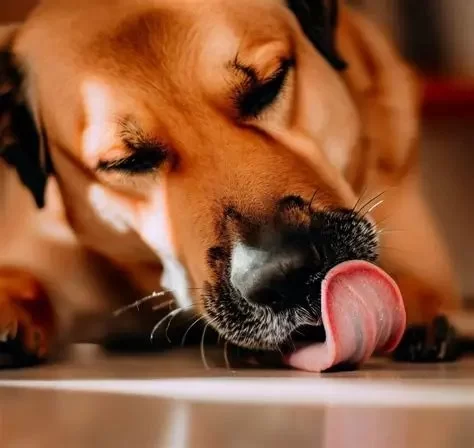- #understanding-constant-licking-in-dogs - Understanding why dogs lick excessively
- #medical-causes-and-health-conditions - Medical reasons behind excessive licking
- #behavioral-and-emotional-factors - Psychological and emotional triggers
- #environmental-triggers-and-allergies - Environmental influences and allergies
- #when-to-see-a-vet - When licking indicates a serious issue
- #treatment-and-home-care - How to address and manage the behavior
- #case-studies-and-real-examples - Real-life cases from pet owners
- #expert-support-from-hidden-brook-veterinary - Get professional care and solutions
1. Understanding Constant Licking in Dogs
When pet owners ask why some dogs lick constantly and how to address it, the answer isn’t always simple. Licking is a natural canine behavior — part grooming, part communication. However, when it becomes excessive or obsessive, it can signal deeper medical or emotional issues. Understanding the underlying cause is the first step toward helping your pet feel comfortable again.
Dogs use licking to soothe themselves, show affection, or relieve discomfort. A healthy dog may lick after meals or during bonding, but persistent licking of paws, air, or furniture often indicates distress or irritation that shouldn’t be ignored.
2. Medical Causes and Health Conditions
Many cases of constant licking have a physical root. Some of the most common medical reasons include skin irritation, pain, or gastrointestinal discomfort. If your dog frequently licks one spot, such as a paw or joint, it may be reacting to localized pain, an insect bite, or an early sign of arthritis.
2.1 Skin Allergies and Infections
Allergies to food, grass, or cleaning chemicals can lead to itchy skin. Dogs often lick excessively to relieve that itch, which unfortunately can worsen the irritation and even cause bacterial infections known as “hot spots.”
2.2 Digestive or Internal Issues
Some dogs lick surfaces obsessively due to nausea or acid reflux. Veterinary studies show a link between gastrointestinal upset and repetitive licking behavior. Treating the stomach issue usually reduces the habit quickly.
2.3 Pain and Joint Problems
Older dogs sometimes lick joints or limbs affected by arthritis. This self-soothing behavior mimics humans rubbing a sore muscle — temporary relief that can mask a chronic issue. Regular vet checkups can identify joint inflammation early and improve quality of life.
3. Behavioral and Emotional Factors
When no physical condition is found, excessive licking often ties to emotional stress or boredom. Dogs are intelligent, social animals — when they lack stimulation or routine, they may redirect their energy into repetitive behaviors like licking.
3.1 Anxiety and Compulsive Disorders
Separation anxiety is a major trigger. A dog left alone too long might lick objects, walls, or itself as a form of self-soothing. Similar to humans biting nails under stress, dogs develop licking as a coping mechanism. Behavioral therapy and environmental enrichment can help break this cycle.
3.2 Lack of Mental Stimulation
High-energy breeds such as Border Collies or Labradors need consistent exercise and brain games. Without them, boredom can transform into compulsive habits. Interactive toys and scent-based activities are simple ways to redirect energy positively.
4. Environmental Triggers and Allergies
Seasonal allergies, chemical exposure, and even household fabrics can prompt licking. Carpets treated with strong cleaners, pollen, or dry winter air may irritate paws or noses. Regular paw rinsing after walks and using hypoallergenic shampoos can prevent recurring issues.
4.1 Nutrition and Diet Quality
A poor diet lacking omega fatty acids and vitamins can lead to dry, itchy skin. Switching to high-quality, veterinarian-recommended food helps restore skin health and reduces licking over time.
5. When Licking Indicates a Serious Issue
While mild licking is normal, constant or obsessive behavior deserves attention. Warning signs include fur loss, sores, bleeding, or restlessness. If your dog’s licking seems focused on one area or accompanied by other symptoms such as limping, vomiting, or changes in appetite, it’s time for a veterinary examination.
Veterinarians can perform skin scrapings, allergy testing, or blood work to rule out infections and metabolic disorders. In many cases, early diagnosis prevents secondary problems like wounds or stress-induced behavior.
6. How to Address and Manage the Behavior
Once the root cause is identified, treatment typically involves a mix of medical care and behavioral adjustment. For allergic skin issues, topical sprays, medicated shampoos, or dietary changes can help. If anxiety drives the licking, desensitization training, increased physical activity, and safe calming aids (like pheromone diffusers) are beneficial.
6.1 Consistency and Environment
Dogs thrive on routine. Keeping feeding, walking, and sleeping schedules consistent reduces anxiety. Provide a designated “comfort space” with familiar toys and blankets to help your pet self-regulate in healthy ways.
6.2 Positive Reinforcement
Reward calm behavior instead of punishing licking. Redirect gently — offer a chew toy or engage your dog in a quick training session when it starts to lick excessively.
7. Real-Life Cases from Pet Owners
One client at Hidden Brook Veterinary shared the story of “Milo,” a rescue beagle who licked his paws raw after thunderstorms. After an exam ruled out allergies, the team developed a noise-desensitization plan and introduced a calming supplement. Within a month, Milo’s behavior improved dramatically. Stories like his remind us that patience and professional guidance often make all the difference.
Another dog, a Golden Retriever named Bella, was found to have a chicken allergy causing chronic paw licking. A simple dietary switch and medicated paw soaks resolved the issue within weeks. This highlights the importance of tailored solutions over one-size-fits-all fixes.
8. Expert Support from Hidden Brook Veterinary
Excessive licking can be frustrating for pet owners, but it’s often your dog’s way of asking for help. At Hidden Brook Veterinary, our team specializes in identifying the root causes behind these behaviors — whether medical, environmental, or emotional. From advanced allergy testing to personalized behavior plans, we offer comprehensive solutions to bring comfort back to your companion’s life.
If your dog won’t stop licking, don’t wait until it becomes a serious issue. Consult with Hidden Brook Veterinary today to ensure your pet receives the compassionate care it deserves and a plan that truly works.












